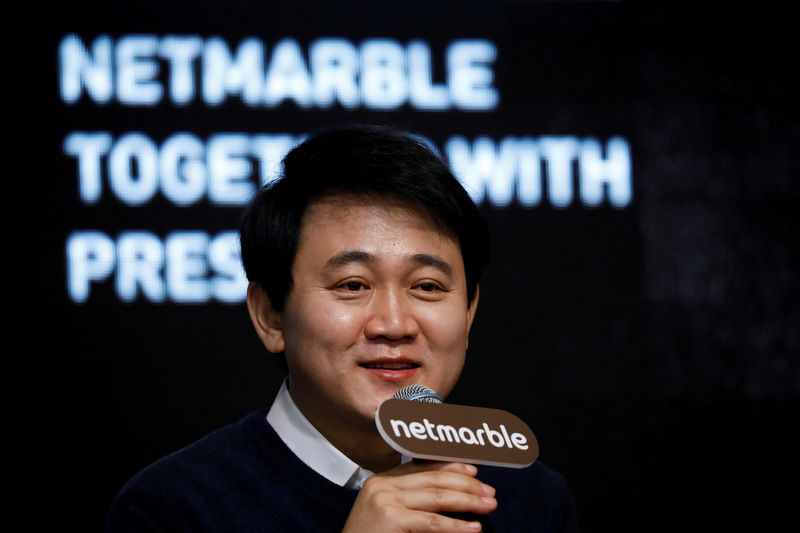By Joyce Lee
SEOUL (Reuters) - When mobile gaming firm Netmarble Games <251270.KS> debuts on Friday, its founder Bang Jun-hyuk will be the only billionaire in South Korea's top-10 wealthiest stock holders with no ties to the chaebol, the mainly family-owned industrial conglomerates that dominate Asia's fourth-largest economy.
Bang's is a rare Korean rags-to-riches story, and the high-school dropout with two business failures on his resume wants the state to revive support for start-up companies and nurture a new crop of businesses as an alternative to the economy's dependence on the industrial might of groups including Samsung (KS:005930) and Hyundai.
Leading candidates in the run-up to Tuesday's presidential election have pledged to reform the powerful chaebol.
"If you look at start-ups these days, they're predominantly about fried chicken delivery, which is worrying," Netmarble's founder and chairman told Reuters. "We need start-ups that will serve as a conduit for new business areas for our future."
Bang, 48, owns 24.5 percent of Netmarble, which priced its $2.3 billion initial public offering at the top of the range. That would make him worth around $2.9 billion and rank him sixth in South Korea's richest stock holders, according to data provider FnGuide.
Bang is part of a generation of South Korean technology entrepreneurs that founded start-ups from the late 1990s when state investment helped create one of the world's most wired nations. Non-chaebol companies founded around then include internet portal Naver (KS:035420) and game developer NCSOFT (KS:036570).
"When people of my generation founded start-ups, it wasn't because we were talented, but because the ground was prepared," Bang said.
"The government had a very clear vision of growing Korea into an IT superpower and sowed the seeds of a good start-up ecosystem. We got new infrastructure, state-driven venture capital and rules like exceptions to mandatory military service, which drove talent into start-ups."
"It's regrettable such support has become fainter in the last few years."
DROPOUT TO SUCCESS
Born into a relatively poor family, Bang dropped out of high school and unsuccessfully founded two start-ups, one of which was an online movie streaming business similar to Netflix (O:NFLX).
"Looking back, there were many new businesses like movie streaming where Korea was ahead of others, and they were spun out of high-speed internet and other infrastructure we had," he said. "But it was very difficult to succeed as there were not many people who were betting on such future businesses at the time."
"When you fail twice, there's nothing left. You've hit bottom not only economically, but mentally... You start thinking, am I stupid? Is this all I am?"
With just $90,000 in seed money from acquaintances, Bang founded Netmarble in 2000 with eight employees. The firm is now worth 13.3 trillion won ($11.8 billion) and its 3,000 employees generate 1.5 trillion won in annual sales.
Netmarble aims to be among the world's top five games companies by 2020, with 5 trillion won in annual revenue, partly through acquisitions.
Even this start-up, though, struggled to break through.
Netmarble was the country's first to distribute other firms' computer games and offer free-to-play games. In 2004, Bang sold a majority stake to conglomerate CJ Group, and stepped down from operations in 2006 due to health issues.
Five years later, CJ asked him to come back as the company was floundering with a series of 19 failed games - 11 flops and eight that never made it to the market - and an operating loss of 2.1 billion won.
SMARTPHONE VISION
Bang had already been preparing a mobile games start-up before the call. He had seen how many phone manufacturers were shifting production lines to smartphones, which then accounted for only a tenth of the mobile market, and he saw the smartphone's potential as a hand-held computing device.
Long-time employees at Netmarble were skeptical when Bang told them the company would move into mobile games and hit 1 trillion won in revenue within five years. At the time, Netmarble had annual sales of around 200 billion won.
"We looked at each other, mystified," said Park Sei-jin, the company's public relation's chief. "One trillion won sounded very remote."
Such were the doubts that no one volunteered for the new mobile games division, so Bang had to appoint one of his personal staff to the team. Bang spent much of his time convincing computer game developers to switch to mobile games.
By 2013, Netmarble had its first hit game, "Everybody ChaChaCha", and soon had a growing list of multiplayer mobile hit games, drawing several investment offers.
Bang said he declined these as he wanted to wait and ultimately have Tencent Holdings (HK:0700) as a partner.
"Tencent is No. 1 in China... If we're going to do business in the large China market, I thought it would be good to have a partner who's strong in China. Almost all strong companies in China offered, but we chose Tencent," he said.
Following Netmarble's IPO, Tencent's $500 million investment in 2014 is now worth around $2 billion.
